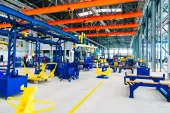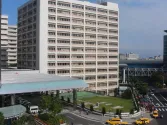
Hong Kong industrial sales may be constrained until end of 2024
The high cost of funds is expected to take its toll on the investment market.
According to a report by Savills, Hong Kong’s logistics sector has faced challenges in recent months, marked by a decline in imports and exports, with decreases of 2.8% and 6.0% YoY respectively in Q3.
“This has directly impacted container throughputs, which experienced a 13.4% YoY decline during the same period. However, there has been a positive development in air cargo throughputs, which rebounded with a 7.6% YoY increase in Q3 2023,” the report said.
Here’s more from Savills:
Not only freight forwarders and cross-border 3PLs, but also local 3PLs catering to the local retail and F&B sectors have encountered stagnant business conditions. The retail sales and restaurant receipts remained stable in Q2/2023 compared to Q1, indicating that both local and visitor spending in retail and dining were not as robust as initially expected.
As logistics demand continues to diminish, warehouse tenants are not actively seeking expansion opportunities. Additionally, the high interest rates and associated cost of funds have made it increasingly challenging for expiring tenants to justify relocations for cost-saving purposes, as any potential rental savings would likely be negated by capital expenditure.
Consequently, leasing activities in Q3 were primarily focused on renewals. As a result, overall and modern warehouse rents experienced a slight adjustment of 0.5% and 0.2% respectively in Q3. The overall vacancy rate saw a slight increase to 3.7%, while the modern warehouse vacancy remained at 3.5% throughout the quarter.
The completion of CaiNiao Smart Gateway at the airport, which offers 4.1 million sq ft of lettable area, poses a significant supply overhang for the sector. Notably, the rumored leasing agreement with a duty-free operator fell through, resulting in their leasing efforts being reset.
Interest rates have continued to rise, with the 3-month HIBOR standing at 5.2% in Q3. This translates to commercial mortgage rates ranging from 6.7% to 7.7%, making property investment less attractive. With such high cost of funding, only end users remained as keen buyers in the market. For instance, the Salvation Army purchased various units in Tung Chun Industrial Building in Kwai Chung for HK$122 million for self-use.
The weaker rebound in retail sales and disappointing external trade performance are expected to further weaken logistics demand. However, sustained growth in e-commerce will likely provide some support to the sector in the coming months. Warehouse landlords facing tenant expiries in the next two years are likely to be flexible with rental terms to maintain occupancy, considering the scarcity of new logistics demand.
The market is expected to resume growth from 2025 onwards as new warehouse completions are gradually occupied, and the full recovery of China's economy brings more supply chain solutions back to the country, with Hong Kong benefiting significantly.
The sales market will continue to be affected by the high cost of funds, leading to further constraints on transaction volume. Positive signs in the investment market may only be observed when interest rates begin to decline, which is anticipated to occur around the end of 2024 or early 2025.



















 Advertise
Advertise






